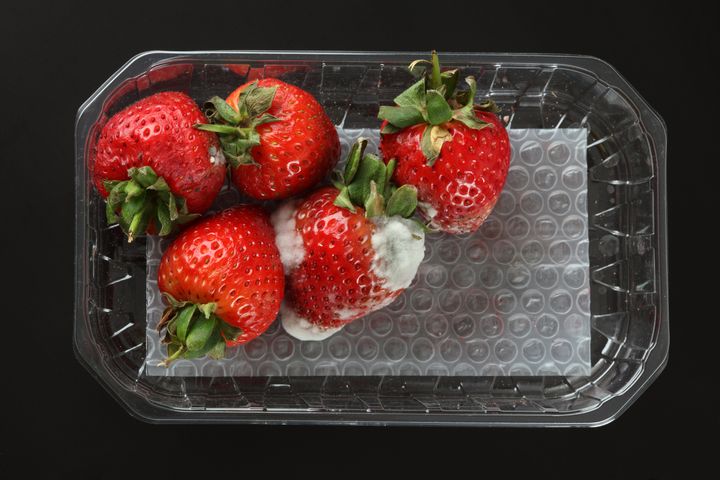Mold Can Have Benefits, Just Not On Our Food
TEXARKANA, Ark. –
Suppose you want a snack. Nothing sounds better than some of those wonderful grapes you bought on sale. But, when you go to the refrigerator and open the crisper drawer, you are faced with a disgusting fur-covered mass where your grapes should be. Mold has made its home on your fruit.
Molds have been around for over three million years, so the likelihood we’ll eliminate their presence is slim. And consider what would happen if we did eliminate them. Some molds perform valuable functions in our lives. For example, they age and flavor cheeses and they are used in bread making, fermenting liquor, producing soy sauce, producing penicillin and manufacturing citric acid used to flavor soft drinks.
Despite these good functions performed by molds, many people think only of the bad things they do. For example, almost everyone can cite cases where mold has hastened food spoilage. People in warm, moist climates are also very aware of the allergy and respiratory problems molds can cause. There are even a few molds that, under the right conditions, can produce mycotoxins or poisons.
The question for you is how can you know if the mold you find in your refrigerator is a good one or one that is dangerous? Unfortunately, the answer is, you can’t. Your best approach is to learn and practice some simple guidelines for avoiding mold growth and handling moldy foods you encounter.
While molds prefer warmer temperatures, many can grow in the refrigerator. Since they produce spores, which may become airborne, it is easy for these spores to accumulate in the enclosed refrigerator. You should clean the inside of your refrigerator every other month with a solution of 1 tablespoon baking soda in a quart of water. Rinse with clear water. Scrub any visible mold growth on rubber gaskets with 3 tablespoons of bleach in a quart of water.
Don’t knowingly buy moldy foods. Examine packages of fresh fruits, vegetables, and cured meats carefully for mold growth. Check around the stem areas of produce since this is where mold growth frequently begins.
As people with allergies to mold can readily verify, mold spores are in the air. So protect foods sitting out by covering with plastic wrap. Be sure perishables are not kept at room temperature for longer than 2 hours.
Is food ruined if it begins to mold? It depends on texture of the food and the amount of mold on it. In general, a firm or hard food with only a little bit of mold can be saved by cutting away the mold. Cut at least an inch of food from around the moldy spot. Be sure the knife does not slice through the mold as these cuts are made since this is a good way to spread mold throughout the food. This procedure works for hard cheeses, cured salami, country ham, smoked turkey and firm fruits and vegetables. With soft foods like jams and jellies, soft cheeses, bread products, and soft fruits and vegetables, there is no way to know how deep the mold has penetrated; therefore, the product should be discarded if mold appears.
Moldy corn-on-the-cob, nuts, flour, grains, dried peas and beans and peanut butter should be discarded immediately. Mold that grows on these products frequently produce very dangerous toxins.
Finally, if you suspect a food has mold, don’t sniff it to see if it smells spoiled. Inhaling mold spores may lead to respiratory problems.
Keeping foods in the refrigerator until they mold is never a good idea. Instead, follow the refrigerator Storage Guidelines on how long to keep foods. You can get your free copy by clicking the link above or by contacting the Miller County Extension Office, 870-779-3609. We're online at cdue@uada.edu, on Facebook and Twitter @MillerCountyFCS or on the web at uaex.uada.edu/Miller.
By Carla Due
County Extension Agent - FCS
The Cooperative Extension Service
U of A System Division of Agriculture
Media Contact: Carla Due
County Extension Agent - FCS
U of A Division of Agriculture
Cooperative Extension Service
400 Laurel Street, Suite 215 Texarkana AR 71854
(870) 779-3609
cdue@uada.edu
Related Links
The Arkansas Cooperative Extension Service is an equal opportunity institution. If
you require a reasonable accommodation to participate or need materials in another
format, please contact your County Extension office (or other appropriate office)
as soon as possible. Dial 711 for Arkansas Relay.
Pursuant to 7 CFR § 15.3, the University of Arkansas System Division of Agriculture
offers all its Extension and Research programs and services (including employment)
without regard to race, color, sex, national origin, religion, age, disability, marital
or veteran status, genetic information, sexual preference, pregnancy or any other
legally protected status, and is an equal opportunity institution.
